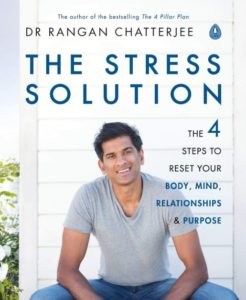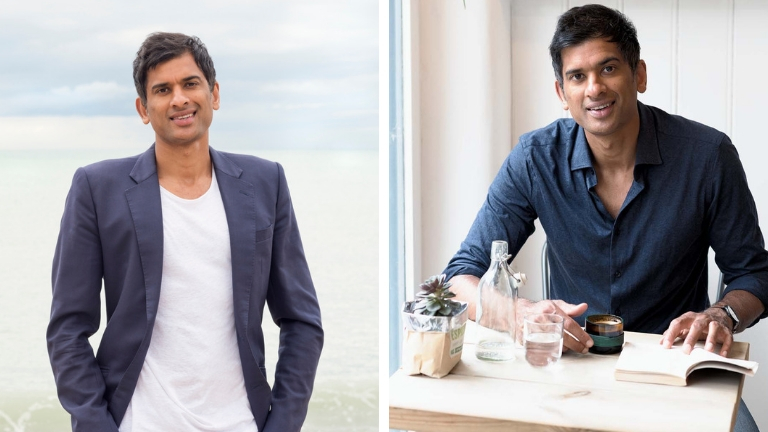Sleep tips are something we all need for true wellbeing. In this video, TV Doctor Rangan Chatterjee gives you three for a better night’s rest
‘Good quality sleep is arguably the most important thing for good health, yet these days many of us are simply not getting enough,’ says Dr Rangan Chatterjee, who appeared in BBC One series Doctor In The House and has released a new book, The Stress Solution: The 4 Steps to Reset Your Body, Mind, Relationships and Purpose.
We’ve all had trouble sleeping at one time or another, whether it’s chronic insomnia or just a bad night. Everyone can benefit from learning a little more about how we can change our daily habits to get more shut-eye at night. Not to mention how nice it would be to wake up rested and ready for the day.
Luckily Doctor Rangan Chatterjee has three tips for getting better sleep.
Sleep tip #1: Enjoy your caffeine before noon
‘Caffeine is a big sleep disrupter and I see this every single day in my practice,’ says Dr Chatterjee. ‘If you have a large cup of coffee at midday, at midnight a quarter of that will still be in your bloodstream.’
A study from the American Academy of Sleep Medicine shows that caffeine intake even six hours before bed can be detrimental and disruptive to your sleeping patterns.
Four hundred milligrams of coffee (or 2-3 cups) six hours, three hours, and just before bed all significantly disrupt your rest. Sleep time was reduced for these participants in the study dramatically – more than one hour of sleep was lost.
‘If you have a large cup of coffee at midday, at midnight a quarter of that will still be in your bloodstream’
While most people would know they shouldn’t drink coffee right before bed, there tends to be less awareness of the negative effects of drinking coffee in the afternoon.
Don’t worry, no one’s asking you to give up your caffeine. Dr Chatterjee says to keep enjoying your tea and coffee. Just make sure you’re doing in the morning so it’s out of your system by the time you’re ready to go to sleep.
Sleep tip #2: Get outside every morning
The sun may not peak out of the clouds every morning, but it’s still important to spend some time outdoors, especially when you first wake up.
‘Exposing yourself to natural daylight in the morning helps set your body’s circadian rhythm,’ Dr Chatterjee says. “Which in turn is going to help you sleep better at night.’
Your circadian rhythm is your body’s internal clock. Your internal clock isn’t run by alarms or work day schedules, but by cues from the outside world like the sun.
‘Exposing yourself natural daylight the morning helps set your body’s circadian rhythm’
A sleep medicine study shows that light plays a primary role in your circadian physiology. Sleep problems arise when your circadian clock and your desired sleep schedule don’t match up. Inappropriate light exposure makes the problems worsen.
However, if you control your light exposure, you can use it to work alongside with your circadian clock. Your exposure to light in a natural environment, especially right away in the morning when you’re about to start your day, will help you out at the end of the day.
Sleep tip #3: Turn off all your modern tech
As addictive as social media is, it might be a good idea to limit your addiction to daylight hours.
Dr Chatterjee says turning off your tablets, smartphones and laptops an hour or ninety minutes before bed can help you fall asleep much more easily.
Natural light helps your circadian rhythm, but electronic light hinders it, according to research from Brigham and Women’s Hospital and Harvard Medical University.
Natural light helps your circadian rhythm, but electronic light hinders it
Their study monitored twelve adult volunteers, half of which read a paper book and half from an e-reader before bed. Those who used electronics took longer to fall asleep, had less Rapid Eye Movement (REM) and were more tired and less alert the next morning.
Electronic light disrupts your circadian rhythm along with suppressing melatonin, the hormone that promotes sleep.
It’s something we’re all guilty of at one time or another, but sleeping with your phone under your pillow isn’t doing you any favours in getting a good night’s rest.

Follow Dr Rangan Chatterjee on Instagram, Twitter and Facebook.
More from Dr Chatterjee:
3 exercise tips this TV doctor wants you to know
3 things this TV doctor wants you to know about mood
3 things this TV doctor wants you to know about healthy weight loss
More Healthista Content:
Got insomnia? This hand reflexology massage could help
Is your Instagram making you ill?
5 effects of stress that seriously impact your health
Like this article? Sign up to our newsletter to get more articles like this delivered straight to your inbox.





















































